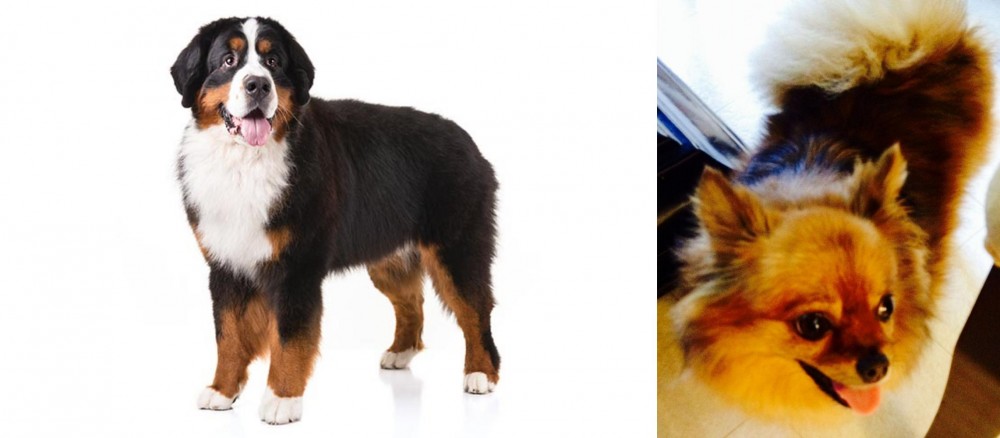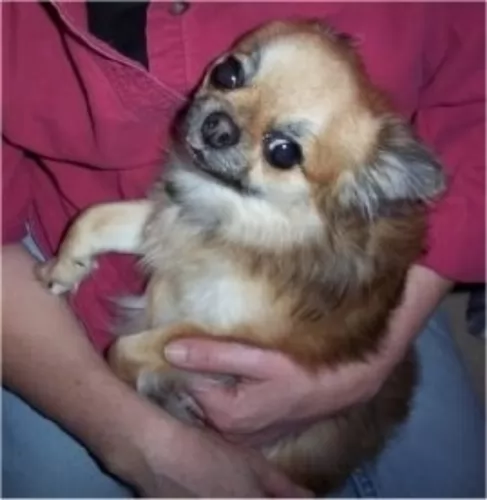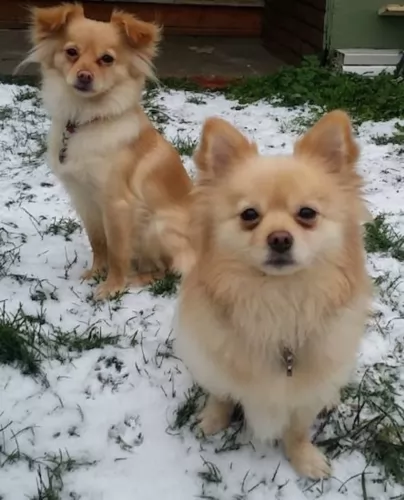 Petzlover
Petzlover Bernese Mountain Dog is originated from Switzerland but Chiapom is originated from United States. Bernese Mountain Dog may grow 46 cm / 19 inches higher than Chiapom. Bernese Mountain Dog may weigh 47 kg / 104 pounds more than Chiapom. Bernese Mountain Dog may live 10 years less than Chiapom. Bernese Mountain Dog may have more litter size than Chiapom. Both Bernese Mountain Dog and Chiapom requires Moderate Maintenance.
Bernese Mountain Dog is originated from Switzerland but Chiapom is originated from United States. Bernese Mountain Dog may grow 46 cm / 19 inches higher than Chiapom. Bernese Mountain Dog may weigh 47 kg / 104 pounds more than Chiapom. Bernese Mountain Dog may live 10 years less than Chiapom. Bernese Mountain Dog may have more litter size than Chiapom. Both Bernese Mountain Dog and Chiapom requires Moderate Maintenance.
 The Bernese Mountain Dog comes from the Swiss Alps and is one of four separate breeds called Sennenhund or “Alpine pasture dog”. The Name Bernese Mountain Dog indicates the area of Switzerland that the dogs come from – the canton of Bern. These groups of dogs accompanied the dairymen and herders and they were farm dogs. They pulled carts, delivered goods from village to village. The Bernese Mountain Dog was part of this group along with: Greater Swiss Mountain Dog, Appenzeller,Entlebucher Mountain Dog and the Bernese Mountain Dog. It is probably true that the Bernese Mountain Dog has been a part of farm life in the Alps for over 2000 years.
The Bernese Mountain Dog comes from the Swiss Alps and is one of four separate breeds called Sennenhund or “Alpine pasture dog”. The Name Bernese Mountain Dog indicates the area of Switzerland that the dogs come from – the canton of Bern. These groups of dogs accompanied the dairymen and herders and they were farm dogs. They pulled carts, delivered goods from village to village. The Bernese Mountain Dog was part of this group along with: Greater Swiss Mountain Dog, Appenzeller,Entlebucher Mountain Dog and the Bernese Mountain Dog. It is probably true that the Bernese Mountain Dog has been a part of farm life in the Alps for over 2000 years.
In some regions of the Alps, these dogs were called Durrbachhund after a small town named Durrbah and are said to be rooted in the Molosser breeds. Tin 1902 the Swiss Kennel Club recognized the Bernese Mountain Dog as a separate breed and the first breed club was founded in 1907 in the region of Burgdorf. The first standard for the breed was written and separated the 4 dogs into their own breeds. The Molosser is an ancient breed whose versatility and travels made it expressly influential in the developing of Mastiff dogs like St. Bernards, Great Pyranees, Mastiffs and Swiss Mountain Dogs like the Bernese.
However at the end of the 19th century famers and shepherds began to import other breeds of working dogs, while at the same time automated modes of transportation began to replace the farm dogs. Under these circumstances the number of Bernese Mountain Dog began to decline and the breed faced potential extinction. A group of people were gathered together to save the Berner, including Franz Schertenleib and Albert Heim. Still today the Bernese are in short supply and because of the need and desire to increase the numbers, some breeding practices have not been as good as they should have been. However, today’s Berner is a great family dog and he still loves to work. He is good at carting, herding, search and rescue, watch dog, tracking, and competitive obedience.
The Bernese Mountain Dog came to the US after World War I and was imported to Britain in the 1930’s. The AKC accepted the Berner as a new Working-Class breed in 1937. It was not until 1968 that the Bernese Mountain Dog Club of America was formed. In 1981, the AKC accepted the club as a member and in 1990 they (AKC) adopted the standard used today to judge the Bernese Mountain Dog.
 The Chi-Pom or Chiapom comes from mixing the Pomeranian and the Chihuahua, and both these dogs are toy breeds and known as companion dogs.
The Chi-Pom or Chiapom comes from mixing the Pomeranian and the Chihuahua, and both these dogs are toy breeds and known as companion dogs.
These little dogs each have their own individual histories, but but being a cross breed, the Chi-Pom’s history isn’t well documented particularly well.
Nobody seems to know precisely when this new dog breed came into being, but they were first bred in the United States.
 The Bernese Mountain Dog is a large, lovable clown. He has a heavy build with a tri color- mostly black – coat. He should have a white chest and rust coloring on the front of his legs, the sides of his mouth, and above his eyes. His eyes should be dark and blue eyes are a disqualification. His coat is silky, thick and long. He has medium sized triangle shaped ears and a scissors bite. He has round toes and strong, straight legs, He is well suited to cold weather. His skull is broad and flat, his muzzle is straight and strong, his nose must be black, and he does not usually drool.
The Bernese Mountain Dog is a large, lovable clown. He has a heavy build with a tri color- mostly black – coat. He should have a white chest and rust coloring on the front of his legs, the sides of his mouth, and above his eyes. His eyes should be dark and blue eyes are a disqualification. His coat is silky, thick and long. He has medium sized triangle shaped ears and a scissors bite. He has round toes and strong, straight legs, He is well suited to cold weather. His skull is broad and flat, his muzzle is straight and strong, his nose must be black, and he does not usually drool.
He is an imposing sight, but he is also as non-aggressive as any breed. He is strong, intelligent, and agile. He should have his dew claws removed. This breed should be self-assured, yet good natured and calm. He is welcoming to strangers and loyal to his people. He needs his people.
 The Chi-Pom or Chiapom isn’t a pure bred dog, but a cross between the Chihuahua and the Pomeranian. This toy breed’s coat can be shortish like the Chihuahua or feathery and medium to long like with the Pomeranian, and the coat will be soft and shiny.
The Chi-Pom or Chiapom isn’t a pure bred dog, but a cross between the Chihuahua and the Pomeranian. This toy breed’s coat can be shortish like the Chihuahua or feathery and medium to long like with the Pomeranian, and the coat will be soft and shiny.
He has pointed ears, much like a fox, and the long tail is carried upward and curls over the back. The coat can be a solid color such as white, tan, cream, fawn, brown or gray, with the most common color being light brown.
If he takes more after the Pomeranian, he may need to have his hair cut. The typical Pomchi dog’s head is more round that the Pomeranian but with the narrow muzzle. The eyes are large and dark.
The Chiapom is a small dog that measures just 15 – 25cm in height and weighs between 2 and 8kg.
Pomchis are intelligent and inquisitive, having a temperament which comes from either of the two breeds which are quite similar.You’re definitely going to have an entertaining little dog, one who is energetic, curious and alert.
He isn’t a good choice with small children as he gets nervous and aggravated when handled improperly. Nervous and hurt, he may nip and then often he gets the blame, whereas he just shouldn’t have to put up with small children.
He loves to be in the company of his human family who treat him well, and he doesn’t like to be left alone. He is an intelligent little dog and is eager to learn. Therefore, even though he is small, training and socialization will be good for him and give him an even more amicable disposition.
 When reading the AKC standard for the Bernese Mountain Dog you will find that the breed is good natured and self-assured. They are not aggressive, shy or anxious. These are gentle, loving dogs. At the same time, they should be socialized to all kinds of animals, people and children when they are puppies. They are happy outside but need to live in the house with their people. They need exercise and play, and because they are so large, they need this outside. But when it comes to cuddling and sleeping they need to be indoors.
When reading the AKC standard for the Bernese Mountain Dog you will find that the breed is good natured and self-assured. They are not aggressive, shy or anxious. These are gentle, loving dogs. At the same time, they should be socialized to all kinds of animals, people and children when they are puppies. They are happy outside but need to live in the house with their people. They need exercise and play, and because they are so large, they need this outside. But when it comes to cuddling and sleeping they need to be indoors.
They love children though you should be careful with small children because of the Berner’s size and their not being aware of their size at times. They are extremely loyal to their people and want to be with people. They are intelligent, and they want to please their people. At the same time, they are sensitive. They do not respond well to punishment or harshness. They are imposing but they are lovers at heart.
 Crossing two breeds of dog is the in-thing these days, and its not surprising that lovers of small breed dogs would think to mix the Chihuahua and the Pomeranian.
Crossing two breeds of dog is the in-thing these days, and its not surprising that lovers of small breed dogs would think to mix the Chihuahua and the Pomeranian.
The Chiapom is affectionate, playful and good-natured with their human family. They are full of personality, are spunky and brave, believing they can protect their families. He may be too frail for this but he alerts you to danger with his barking.
With the Chiapom, you’re going to have an awesome little friend who will stand by you in thick and thin.
 Even though it is well known that cancer is the leading cause of dog deaths across the globe, the Bernese Mountain Dog is particularly prone to die of cancer. Half of all Berners compared with 27% of all dogs, die from cancer. The Berner’s life span is also shorter than most dogs his size. IT is also not just one cancer that attacks the Bernese Mountain Dog but rather at least 6 or more including mast cell, osteosarcoma, malignant histiocytosis, fibrosarcoma, and lymphosarcoma.
They can also suffer from PRA (Progressive Retinal Atrophy), hypoadrenocorticism, cataracts and histiocytic sarcoma. Another issue that plaques the Berner more than other breeds is musculoskeletal issues that cause mortality. This can include issues such as cruciate ligament rupture, arthritis and hip dysplasia. These types of aliments cause death in 6% of the breed while they are usually the cause of mortality in only 2% of all other dogs.
Even though it is well known that cancer is the leading cause of dog deaths across the globe, the Bernese Mountain Dog is particularly prone to die of cancer. Half of all Berners compared with 27% of all dogs, die from cancer. The Berner’s life span is also shorter than most dogs his size. IT is also not just one cancer that attacks the Bernese Mountain Dog but rather at least 6 or more including mast cell, osteosarcoma, malignant histiocytosis, fibrosarcoma, and lymphosarcoma.
They can also suffer from PRA (Progressive Retinal Atrophy), hypoadrenocorticism, cataracts and histiocytic sarcoma. Another issue that plaques the Berner more than other breeds is musculoskeletal issues that cause mortality. This can include issues such as cruciate ligament rupture, arthritis and hip dysplasia. These types of aliments cause death in 6% of the breed while they are usually the cause of mortality in only 2% of all other dogs.
 Being a cross bred, the Chiapom will be healthier than the purebred Chihuahua or Pomeranian. He is full of personality, but sometimes he can have his fair share of doggy troubles too.
Being a cross bred, the Chiapom will be healthier than the purebred Chihuahua or Pomeranian. He is full of personality, but sometimes he can have his fair share of doggy troubles too.
He is more prone to injuries just because he gets under your feet all the time. We look at one or two health issues with this small breed that you should be aware of -
This is an ailment which can be found in all dogs but it occurs more in smaller dogs. An inflamed pancreas from trauma, infection or a metabolic disorder can mean your little dog vomiting, being uncomfortable with stomach pain and shivering.
This is a disease which involves the trachea which is also known as the windpipe. When the windpipe weakens, it becomes difficult to breath. Obesity in your pet as well as dust and kennel cough can contribute to this ailment.
 As with any large purebred dog, the Bernese Mountain Dog needs high quality food that will provide hi with nutrition and keep him from becoming overweight if fed properly. He is however a very large dog with a very large appetite. Watch his calorie intake. It’s ok to use treats if you fit them into the overall calorie intake for the day. Feed him smaller meals twice a day.
As with any large purebred dog, the Bernese Mountain Dog needs high quality food that will provide hi with nutrition and keep him from becoming overweight if fed properly. He is however a very large dog with a very large appetite. Watch his calorie intake. It’s ok to use treats if you fit them into the overall calorie intake for the day. Feed him smaller meals twice a day.
As previously mentioned the breed has quite a few health challenges to deal with, cancer being the number one issue. The small genetic line is one of, if not the main, culprit in this high mortality rate and short life span of the Bernese Mountain Dog. In addition to the conditions mentioned above, they are also susceptible to bloat (stomach inversion). In addition, they face the conditions mentioned previously and should be tested for dysplasia of the hip and elbow, Von Willebrand’s Disease, Cardiac testing and an eye or ophthalmologist exam.
The Bernese Mountain Dog is a gentle giant. They have a calm happy demeanor and they love to work. In fact, they need to work. They love children and will quickly give them cart rides. They compete in carting competitions and herding events sponsored by the AKC. They need exercise but not an extreme amount or intense type. A half-hour a day is enough for them. They love long walks or hiking. They are great companions for backpacking or camping. They are also good at tracking, rally, obedience, and agility.
 The Pomchi is a small dog who is looked upon essentially as an indoors dog, so it is quite able to adapt to apartment living as he won’t require large doses of exercise.
The Pomchi is a small dog who is looked upon essentially as an indoors dog, so it is quite able to adapt to apartment living as he won’t require large doses of exercise.
With some stimulating toys, he is able to exert energy indoors and will love to chase a ball down the passage. He certainly won’t do well in cold weather and being left outdoors.
The Chiapom often has the longer hair of the Pomeranian so it becomes necessary to give your little dog a good brush twice a week for the hair to remain tangle-free and to keep it shiny and silky.
You’ll notice with your Pomchi that he could possibly have overactive tear ducts so that they have a discharge. A small damp cloth can be used to wipe his eyes.
Small breed dogs often require more calories than larger dogs because of their higher metabolic rates. He is a small dog that will require all the right vitamins and minerals.
Commercial dog foods are certainly convenient, and the best quality ones contain the nutrients a dogs needs to remain health. It is always beneficial for your 4-legged friend if you can include some brown rice, a little bit of cooked chicken and vegetables in his diet. However, if you are uncertain about the nutrition requirements of your pet, speak to your vet and get help with a food that caters for your dog’s age, breed and activity levels.